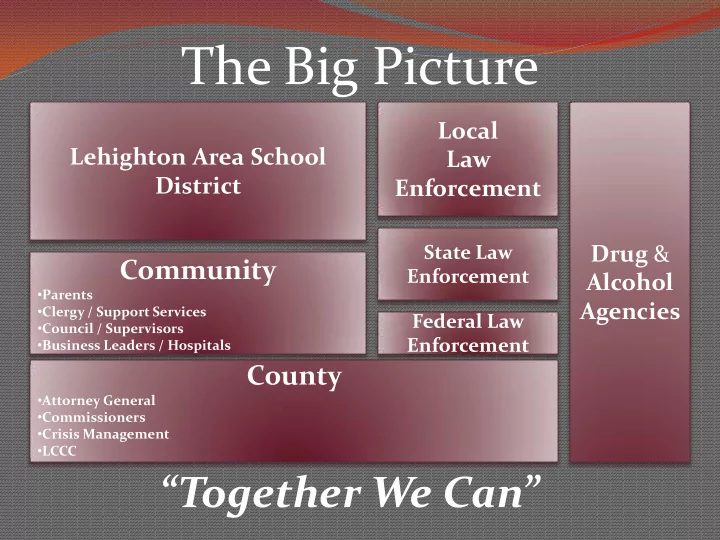

The Big Picture Local Lehighton Area School Law District Enforcement State Law Drug & Community Enforcement Alcohol • Parents Agencies • Clergy / Support Services Federal Law • Council / Supervisors Enforcement • Business Leaders / Hospitals County • Attorney General • Commissioners • Crisis Management • LCCC “Together We Can”
“Together We Can”
Kindergarten – 4 th Grade Character Education / Decision Making Skills Personal responsibility for ones actions Good Health Practices Bullying Social Influences that interfere with decision making
Health Curriculum (K-4) Kindergarten Why medicines are used Safely using and storing medicines Harmful effects of tobacco and alcohol on the body How medicine helps us get well
Health Curriculum (K-4) 1 st Grade Respecting yourself by refusing illegal drugs Not taking medicine that belongs to others Harmful effects of tobacco and alcohol Reasons for needing to take medicine
Health Curriculum (K-4) 2 nd Grade Safe use of medicines (reading labels) Harmful effects of caffeine, alcohol and tobacco Ways of refusing drugs and/or alcohol Taking medication only with supervision
Health Curriculum (K-4) 3 rd grade The different forms of tobacco and their effects The immediate and long-term effects of alcohol Refusing peer pressure to use tobacco and/or alcohol Being trustworthy and following family rules
Health Curriculum (K-4) 3 rd Grade (Cont.) How drugs may be helpful or harmful Illegal drugs and how they are harmful Prescription drugs and how they help people Refusing to be put into dangerous situations
Health Curriculum (K-4) 4 th Grade Safe use of medicine The harmful effects of inhalants The dangers of illegal drugs Refusal of illegal drugs (peer pressure)
Additional Subjects Covered K-4 Kindergarten Bullying, Acceptance and Value of Friendship First Grade Friends, Bullying Second Grade Manners, Bullying Third Grade Study Skills, Careers, Bullying, Anxiety Fourth Grade Study Skills, Careers, Bullying, Anxiety
Middle School (Grades 5-8) Skills for Adolescents Class Curriculum Physical, Social and Emotional Changes Self Confidence Peer Pressure Goal Setting (Education)
Middle School (Grades 5-8) Skills for Adolescents Class Curriculum (Cont.) Goal Setting (Career) What is a drug Drug addictions and tolerance Anti-drug ideas (sports, reading, clubs and activities)
Additional D & A Coverage (5-8) Student Assistance Program Grade level meetings to explain the referral process Provides information pamphlets on Drugs and Alcohol Provides a certified D & A Counselor when needed Red Ribbon Week (October) Daily morning D & A education facts Anti-drug messages displayed throughout the building Students Peer Program HS students talk with students to help them with the social transition into the HS.
High School (Grades 9-12) Education All students are required to take wellness class Imbedded D & A lessons throughout school curricula Use of D & A curriculum through guidance and wellness courses Safe Schools Ambassador Program
High School (Grades 9-12) Student Assistance Groups SAP program explained to all grades (referral process) 7 staff members meet weekly to discuss referrals and meet with parents when needed Students Against Destructive Decisions (SADD) Trained “Flight Team” members (provide counseling service to area school districts when needed)
High School (Grades 9-12) Assemblies Ron Glodoski (negative impact of drugs on ones life) Jamie Drake/Rob Mulkulski (discussed D & A issues) District Attorney (legal ramifications) Jim Tkach (mental health and suicide)
Special Services (K-12) Nurses Counsel students and parents about sharing prescription medication Are trained to recognize signs of substance abuse SAP team members( educational pamphlets in office) Review medication policy for students on a regular basis
Special Services (K-12) Intervention Specialists (Coping Strategies) Understanding Drugs and Medication Alcohol and/or Drug addiction Proper use of prescription drugs Effects of specific drugs and mixing drugs
Special Services (K-12) Intervention Specialists (Coping Strategies) Cont. Lifestyle choices Leading a Healthy Life Self-Esteem Managing Stress
GOAL “A Committee with Representation From All Parties Addressing The Big Picture ” Thank You For Your Support
Recommend
More recommend